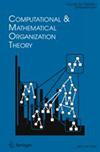Theorizing the Economy of Traces: From Audit Society to Surveillance Capitalism
IF 1.5
4区 管理学
Q3 COMPUTER SCIENCE, INTERDISCIPLINARY APPLICATIONS
Computational and Mathematical Organization Theory
Pub Date : 2022-07-01
DOI:10.1177/26317877211052296
引用次数: 8
Abstract
This essay is a conversation between Shoshana Zuboff’s theory of surveillance capitalism, Mikkel Flyverbom’s conceptualization of the hyper-visibility afforded by digital architectures, and my own ‘analog’ theory of accounting dynamics in the ‘audit society’. Drawing upon trends in accounting practice and research I develop a number of inflection points which define theoretical tensions between the concepts of audit society and surveillance capitalism. These tensions suggest that theoretical innovation is required in the face of: the accelerating constitution of organizations by platforms and their processes – ‘platformization’; the constitution of human agents as data-driven subjects of these data architectures – ‘cyborgization’; and the reconstruction of the social sciences by a pervasive data positivism in which accounting becomes ‘accountics’. The exploration of these three inflection points reveals the deep operational logic of surveillance capitalism as an ‘economy of traces’ and traceability. Zuboff’s challenge of a political dystopia governed by technology giants and Flyverbom’s image of a society ‘overlit’ by digital architectures necessitate a re-specification of the audit society dynamics that I have previously theorized. The re-specification that I propose in this essay is a form of a critical ‘traceology’ which takes as its focus the ongoing production of all manner of traces and how they make up organizations, people and forms of knowledge.痕迹经济理论化:从审计社会到监督资本主义
这篇文章是对Shoshana Zuboff的监督资本主义理论,Mikkel Flyverbom的数字架构提供的超可见性概念化,以及我自己在“审计社会”中会计动态的“模拟”理论之间的对话。根据会计实践和研究的趋势,我提出了一些拐点,这些拐点定义了审计社会和监督资本主义概念之间的理论紧张关系。这些紧张关系表明,面对以下问题,理论创新是必要的:平台及其过程加速构成组织——“平台化”;人类代理作为这些数据架构的数据驱动主体的构成——“网络化”;通过普遍的数据实证主义对社会科学的重建,会计变成了“会计学”。对这三个拐点的探索揭示了监控资本主义作为一种“痕迹经济”和可追溯性的深层运作逻辑。Zuboff对由科技巨头统治的政治反乌托邦的挑战,以及Flyverbom对被数字架构“遮蔽”的社会的形象,都需要对我之前理论化的审计社会动态进行重新规范。我在这篇文章中提出的重新规范是一种批判的“痕迹学”形式,它将所有形式的痕迹的持续生产以及它们如何构成组织,人员和知识形式作为其重点。
本文章由计算机程序翻译,如有差异,请以英文原文为准。
求助全文
约1分钟内获得全文
求助全文
来源期刊

Computational and Mathematical Organization Theory
COMPUTER SCIENCE, INTERDISCIPLINARY APPLICATIONS-MATHEMATICS, INTERDISCIPLINARY APPLICATIONS
CiteScore
3.80
自引率
16.70%
发文量
14
审稿时长
>12 weeks
期刊介绍:
Computational and Mathematical Organization Theory provides an international forum for interdisciplinary research that combines computation, organizations and society. The goal is to advance the state of science in formal reasoning, analysis, and system building drawing on and encouraging advances in areas at the confluence of social networks, artificial intelligence, complexity, machine learning, sociology, business, political science, economics, and operations research. The papers in this journal will lead to the development of newtheories that explain and predict the behaviour of complex adaptive systems, new computational models and technologies that are responsible to society, business, policy, and law, new methods for integrating data, computational models, analysis and visualization techniques.
Various types of papers and underlying research are welcome. Papers presenting, validating, or applying models and/or computational techniques, new algorithms, dynamic metrics for networks and complex systems and papers comparing, contrasting and docking computational models are strongly encouraged. Both applied and theoretical work is strongly encouraged. The editors encourage theoretical research on fundamental principles of social behaviour such as coordination, cooperation, evolution, and destabilization. The editors encourage applied research representing actual organizational or policy problems that can be addressed using computational tools. Work related to fundamental concepts, corporate, military or intelligence issues are welcome.
 求助内容:
求助内容: 应助结果提醒方式:
应助结果提醒方式:


